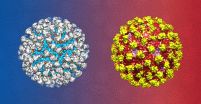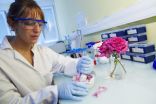Found: Antibody that zaps resilient dengue serotype
2015-07-02
(Press-News.org) One more piece and we are done! A research team led by the Duke-NUS Graduate Medical School Singapore (Duke-NUS) has found the second-to-last piece of the puzzle needed to potentially cure or treat dengue. This is welcome news as the dengue virus infects about 400 million people worldwide annually, and there is currently no licensed vaccine available to treat it.
Associate Professor Shee-Mei Lok and Research Fellow Guntur Fibriansah, from the Duke-NUS Emerging Infectious Diseases (EID) Programme, led research that showed how an antibody neutralises dengue virus serotype 2 (DENV-2). Published online in Science on 3 July 2015, this discovery could help with the development of dengue therapeutics.
Dengue virus has four serotypes (DENV1-4) circulating in nature, which makes it difficult to treat. To have complete protection against the dengue infection, a vaccine has to simultaneously stimulate an equally strong antibody response against all four serotypes. This, so far, has been proven difficult, as vaccines provide differing levels of protection against the serotypes. Latest clinical trials show good protection against DENV-3 and DEN-4, but poor protection against DENV-1 and no protection, at all, against DENV-2.
In this current work, the EID led team demonstrated, in detail, how a potent human derived antibody (2D22) can kill DENV-2. In past research, Assoc. Prof. Lok has shown that the DENV-2 is more complex than the rest of the dengue serotypes as the mosquito-derived virus has a highly dynamic structure which changes its form, or morphology, as it infects humans. This makes DENV-2 harder to kill. While previously identified antibodies could only kill DENV-2 of a certain morphology, the newly discovered antibody can kill DENV-2 of all morphologies.
"While the injection of other weaker types of antibodies into mice were previously shown to result in the development of more severe symptoms, the new human antibody found in this study not only kills DENV-2, it also prevents the development of severe disease stimulated by the weaker antibodies. This clearly illustrates the potential of using this antibody for dengue treatment," said senior author Assoc. Prof. Lok, whose lab previously also identified antibodies that kill DENV1 and DENV3.
Assoc. Prof. Lok's overall strategy is to develop a safe therapeutic by combining four antibodies that inhibit infection of each of the dengue virus serotypes. Her team is now working on identifying an antibody effective against DENV-4 to complete the full set of antibodies and to use it to make an effective cocktail against all serotypes.
INFORMATION:
This research was a collaboration between researchers from Duke-NUS, Vanderbilt University, the University of North Carolina and the University of California, Berkeley.
[Attachments] See images for this press release:

ELSE PRESS RELEASES FROM THIS DATE:
2015-07-02
In a new Science study, Duke-NUS Graduate Medical School Singapore (Duke-NUS) scientists have identified how small changes in dengue's viral genome can affect the virus' ability to manipulate human immune defences and spread more efficiently. This research is the first of its kind that examined the dengue virus starting from broad population level observations and then linked it to specific molecular interactions, to explain an outbreak. This work provides a framework for identifying genomic differences within the virus that are important for epidemic spread.
Dengue virus ...
2015-07-02
This news release is available in Japanese. Detailed tabletop experiments are helping researchers understand how Earth's landscapes erode to form networks of hills and valleys. The findings, which highlight a balance between processes that send sediments down hills and those that wash them out of valleys, might also help researchers predict how climate change could transform landscapes in the future. Kristin Sweeney and colleagues developed a laboratory device that mimicked the processes that smooth or disturb soil to make hillslopes, and those that cut it away to make ...
2015-07-02
This news release is available in Japanese. Researchers have discovered that a human antibody specific to dengue virus serotype 2, called 2D22, protects mice from a lethal form of the virus -- and they suggest that the site where 2D22 binds to the virus could represent a potential vaccine target. The mosquito-borne virus, which infects nearly 400 million people around the world each year, has four distinct serotypes, or variations, and there is currently no protective vaccine available. Recent phase 3 clinical trials of a potential vaccine candidate showed poor efficacy, ...
2015-07-02
Why is the seahorse's tail square? An international team of researchers has found the answer and it could lead to building better robots and medical devices. In a nutshell, a tail made of square, overlapping segments makes for better armor than a cylindrical tail. It's also better at gripping and grasping. Researchers describe their findings in the July 3 issue of Science.
"Almost all animal tails have circular or oval cross-sections--but not the seahorse's. We wondered why," said Michael Porter, an assistant professor in mechanical engineering at Clemson University and ...
2015-07-02
This news release is available in Japanese. Researchers working with roses have identified an enzyme, known as RhNUDX1, which plays a key role in producing the flowers' sweet fragrances. These ornamental plants, which provide essential oils for perfumes and cosmetics, have been bred mostly for their visual traits, and their once-strong scents have faded over the generations. Restoring their fragrant odors will require a better understanding of the rose scent biosynthesis pathway. Until now, most studies of rose fragrance have focused on a biosynthetic pathway that generates ...
2015-07-02
This news release is available in Japanese. The seahorse tail is square because this shape is better at resisting damage and at grasping than a circular tail would be, a new engineering study shows. Insights gleaned from the study could inspire new armor and advances in robotics, the authors say. While most animals with tails, including certain monkeys, lizards and rodents, have soft, cylindrical-shaped appendages, tails of seahorses are organized into square prisms surrounded by bony plates. To better understand why the seahorse tail deviates from the norm, and what ...
2015-07-02
Mass killings and school shootings in the U.S. appear to be contagious, according to a team of scientists from Arizona State University and Northeastern Illinois University.
Study author Sherry Towers, research professor in the ASU Simon A. Levin Mathematical, Computational and Modeling Sciences Center, explained, "The hallmark of contagion is observing patterns of many events that are bunched in time, rather than occurring randomly in time."
Her team examined databases on past high-profile mass killings and school shootings in the U.S. and fit a contagion model to ...
2015-07-02
Climate change is forcing fish out of their current habitats and into cooler waters and many more species will soon be affected if climate goals are not met, say scientists.
An international team of researchers compared the future of the oceans under two climate change scenarios. In one scenario, we limit atmospheric warming to two degrees by 2100, as outlined by the Copenhagen accord. In the other, we continue with the current approach, which researchers say would cause a five-degree increase in atmospheric temperatures. They say if warming continues unchecked, fish ...
2015-07-02
A new study has discovered mysterious behaviour of a material that acts like an insulator in certain measurements, but simultaneously acts like a conductor in others. In an insulator, electrons are largely stuck in one place, while in a conductor, the electrons flow freely. The results, published today (2 July) in the journal Science, challenge current understanding of how materials behave.
Conductors, such as metals, conduct electricity, while insulators, such as rubber or glass, prevent or block the flow of electricity. But by tracing the path that electrons follow ...
2015-07-02
Researchers at Vanderbilt University and the National University of Singapore have determined the structure of a human monoclonal antibody which, in an animal model, strongly neutralizes a type of the potentially lethal dengue virus.
The finding, reported today July 2 in the journal Science, could lead to the first effective therapies and vaccines against dengue, a complex of four distinct but related mosquito-borne viruses that infect about 390 million people a year and which are a leading cause of illness and death in the tropics.
"Scientists in the antibody discovery ...
LAST 30 PRESS RELEASES:
[Press-News.org] Found: Antibody that zaps resilient dengue serotype




